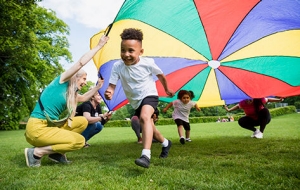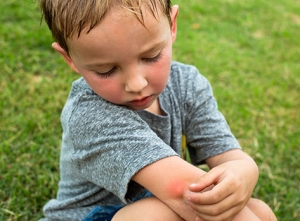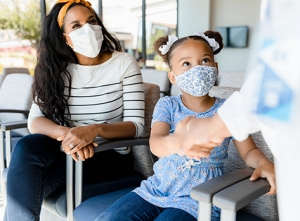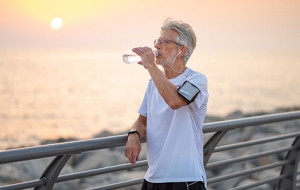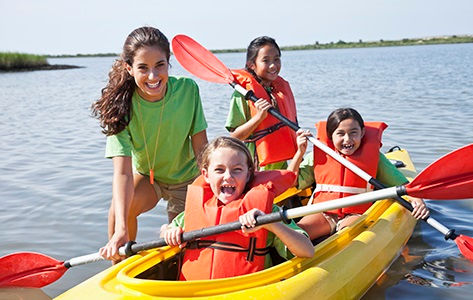
Some of the greatest joys of summer camps are the chance to learn new activities and make new friends. Whether kids are playing together in the water, on the field, or in the woods, here are a few tips to keep them safe and happy while they learn and grow away from home.
1. Safe Swimming
Swimming is one of the most common activities at summer camp. For many children, cooling off in water is one of the highlights of summer. But some bodies of water can be potentially dangerous places.
“Depending on a child’s age or swimming ability, a life vest is a good idea for kids swimming in the ocean, a pond, or a lake due to underwater darkness and obstacles, hidden currents, or other potential hazards,” says Rachel Gwertzman, DO, a pediatrician at Atlantic Health System. She adds that young, inexperienced swimmers should also wear a life vest or life jacket in the pool until they’ve developed solid swimming skills.
“When it comes to swimming, teach your children about the buddy system and make sure they’re always supervised in the water,” says Dr. Gwertzman. “Although most water activities are supervised by a CPR-certified lifeguard, it’s always a good idea to teach your child to swim before sending them off to camp.”
2. Great Gear
Summer camp is a perfect place to get lots of physical exercise — running, jumping, and hiking. To avoid injury, be sure your child is equipped with sturdy shoes, appropriate clothing and the supplies they need for whatever type of camp they’re attending.
“There’s no universal list of gear for every camp, rather, there’s the right gear for certain types of camp. A child headed off to an overnight wilderness camp will need different equipment than a child who is heading to a day camp for swimming,” Dr. Gwertzman says.
If your child will be riding things with wheels or playing sports, ask the camp staff about policies for helmet use. Whether riding a scooter or bike, horseback riding, playing football or rock climbing, children should always wear a properly fitted helmet designed for the activity.
“The key to injury prevention is to wear the right equipment and make sure there is appropriate supervision,” says Dr. Gwertzman.
3. Hydrating for Heat
The physical activity kids experience at summer camp usually takes place in hot, humid weather. “When kids are having fun outside, they sweat more due to the heat and heightened activity — and often don’t realize they need to take a water break,” advises Dr Gwertzman. “Hydration is critically important to keep kids safe and healthy.”
Campers need to drink plenty of water to replenish the fluids they lose from heat, sweat and activity. If a child doesn’t drink enough water, heat exhaustion, heat stroke and dehydration can begin to set in, and this gets dangerous.
Send your child to camp with a reusable water bottle and remind them about the importance of drinking water throughout the day. Make sure the camp has plenty of water breaks built into activities. Parents can also help at home by helping kids hydrate the day before they go to camp, which is equally as important as it is during camp activities.
4. Sun Safety
Outdoor camp fun often means exposure to the sun’s harmful UV rays, which can cause sunburn and skin damage. Campers should have layers of sun protection, starting with sunscreen that is correctly applied, and reapplied every two hours throughout the day, as well as after swimming.
The American Academy of Dermatology recommends that all kids, regardless of their skin tone, wear water-resistant sunscreen with an SPF of 30 or higher. Kids should use generous amounts of sunscreen on every exposed body part including arms, legs, face, ears, hands, feet, shoulders, and behind the neck. Many camps ask children to apply their own sunscreen, so practice with your child ahead of time.
Clothing also offers a layer of protection from the sun. Look for lightweight, tightly woven clothes or items labeled ‘sun protective’. Also, encourage children to find shade whenever possible.
5. Bye-Bye Bug Bites
Kids share the great outdoors with creatures big and small, so it’s important to protect them from critters that bite. Aside from being an itchy nuisance, insect bites can lead to allergic reactions or wounds that can become infected.
“Mosquitos and ticks can both carry disease,” says Dr. Gwertzman. “Ticks can carry Lyme disease and other pathogens and, in New Jersey, prevention of Lyme disease is very important.”
Lightweight clothing that covers exposed skin offers some protection from mosquitos and ticks. Insect repellent should be applied to exposed skin and the outside of clothing. It should not be applied to sunburned skin or on open cuts, wounds, broken or irritated skin. Repellent should NOT be applied to young children’s hands or around eyes and mouth.
Dr. Gwertzman recommends applying an insect repellent with a DEET concentration of 10 to 30% and washed off daily. A lower concentration works for a shorter length of time (i.e., 10% DEET provides protection for one to two hours and 30% DEET protects up to five hours.) Using more does not make the repellent more effective. Nightly tick checks are also important.
For children who will be outdoors for prolonged periods of time or in areas with a high insect infestation, a bug repellent with a higher concentration of DEET is recommended. Parents may also want to consider clothing coated in a permethrin bug repellent as an additional layer of protection.
Making Memories
When your children look back on their summer camp experiences, they will likely remember the camaraderie, songs, laughter, and the friends they made. Parents can play a major role in an enjoyable camp experiencing by ensuring that kids are safe, healthy, and happy with these guidelines that help make a child’s lifelong memories happy ones.
Be Proactive About Their Health
Kids create memories that last a lifetime during summer camp. Our pediatricians are here to guide you so your child can have a safe and fun camp experience.
Related Articles
Your Healthy Summer Guide
Atlantic Health System is your healthy summer guide to a safe and fun season. From helpful tips to preventive and urgent care, we've got you covered for whatever summer brings.
Preparing Your Child for Summer Camp
Kids create memories that last a lifetime during summer camp. Follow these tips to help keep your child’s summer safe, healthy, and happy.
Three Common Summer Skin Rashes in Kids, What You Need to Know
Childhood rashes from plants, bugs and infections are common during summer months -- and kids tend to scratch the itch, often unknowingly. Here’s how to prevent and treat three common rashes and make sure they don’t become something more.
Help! Where Should I Take My Child for Care?
Unexpected accidents and illnesses happen all the time – so make sure you know where to go when a health emergency strikes.
5 Cool Tips to Prevent Heat-Related Illness
Learn 5 tips to help you stay cool and safe during hot and sticky summers and avoid heat-related illness.
Protect Your Skin from Sun Damage this Season
Summertime activities bring us out in the sun. Whether it’s time spent at the beach, pool, park, or garden, it’s important to protect your skin from the glare of ultraviolet (UV) rays -- and lower your risk of potential skin damage.

